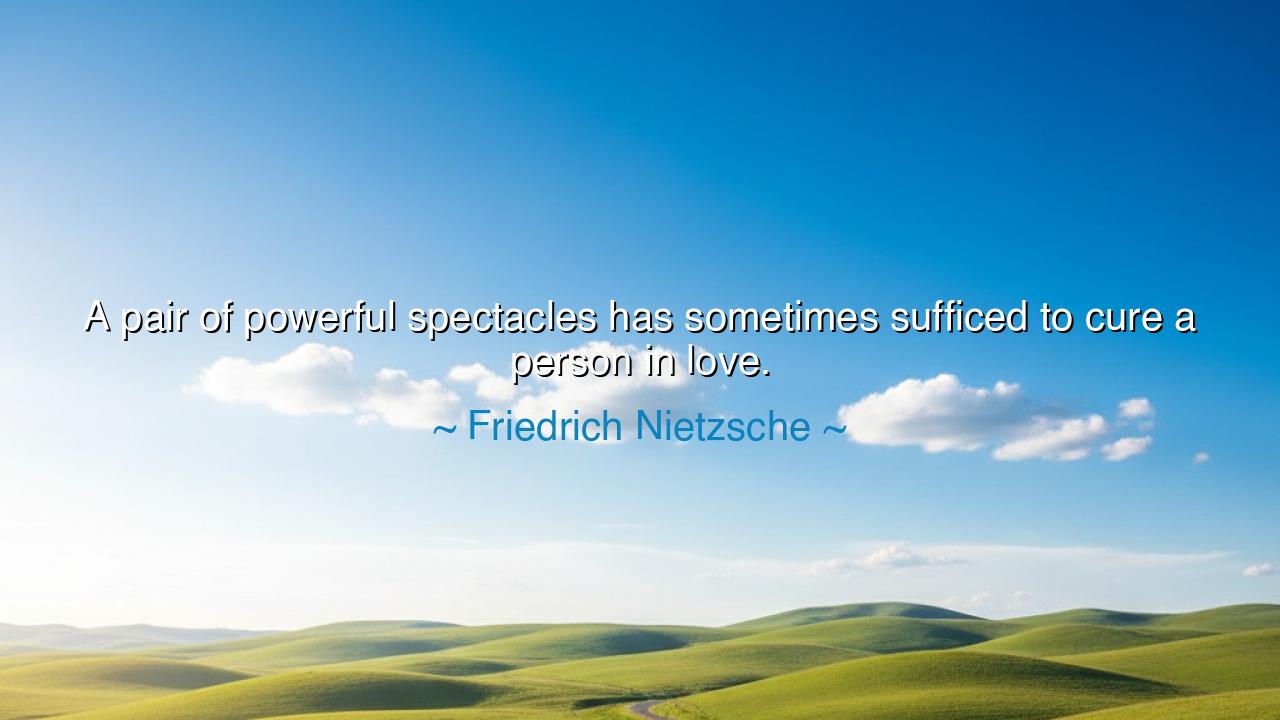
A pair of powerful spectacles has sometimes sufficed to cure a






"A pair of powerful spectacles has sometimes sufficed to cure a person in love." These words from Friedrich Nietzsche are a sharp reflection on the nature of love and perception, revealing a truth about how our emotions can cloud our judgment. Love is often seen through the lens of desire, passion, and idealization. When we are in the throes of love, it can be as though we are wearing glasses tinted by our feelings—viewing the world, and especially the object of our affection, in a light that is distorted and unreal. Nietzsche’s words suggest that sometimes, all it takes to "cure" the blinders of love is a clearer vision, a more objective perspective, to strip away the illusions and see things as they truly are.
O children of the earth, heed this wisdom: when we fall into love, we often lose sight of reality. The heart, overwhelmed by emotion, sees only the beauty, the potential, and the perfection of the one we love. We become blind to their flaws, and sometimes even to the truth of the relationship itself. Love becomes a veil, hiding imperfections and distorting reality. But as Nietzsche so cleverly suggests, a pair of spectacles, a tool for clearer vision, can sometimes be the cure. The clarity brought by such a shift in perception reveals the truth beneath the surface, cutting through the haze of idealization and allowing us to see the person we love as they truly are—flaws and all.
Consider the tale of King Solomon, renowned for his wisdom but also for his many loves. It is said that Solomon, in his youth, was swept away by the allure of beauty and passion, taking many wives and concubines from different lands. However, in his later years, it is written that his wisdom finally prevailed, and he was able to see clearly that his romantic entanglements had brought him away from the truth of his faith and his kingdom. Solomon’s clarity, gained over time and through introspection, allowed him to discern that love—though powerful—must be tempered with wisdom. The spectacles of wisdom, in this case, cured him of his emotional blindness and helped him to recognize the consequences of his actions.
Similarly, the story of Orpheus and Eurydice in Greek mythology offers a poignant example of how love can cloud one's judgment. Orpheus, the great musician, was so consumed by his love for Eurydice that he journeyed to the underworld to bring her back from the dead. He was told that he must not look back at her until they reached the surface, yet his longing and desperation led him to glance behind him, losing her forever. In this tale, Orpheus’s overwhelming love blinded him to the wisdom of the gods and the truth of his task. His emotional vision, clouded by love, ultimately led to tragedy. Had he been able to see the situation with clearer eyes, guided by reason and patience, the outcome might have been different.
And so, Nietzsche’s quote is not a dismissal of love, but a reminder that we must strive for balance. Love is not inherently harmful, but when we are blinded by it, we risk making choices that are not in our best interest. The "spectacles" that Nietzsche speaks of are not merely physical glasses, but represent the tools of wisdom, objectivity, and clarity of thought. Just as one would put on glasses to improve their sight, so too must we apply reason and understanding to our emotions, especially in matters of the heart. In doing so, we can avoid the pitfalls of idealization and make decisions based on the truth, not on an emotional fog.
In your own lives, remember this: when you find yourself caught in the depths of love, take a moment to step back and put on your metaphorical spectacles. Look at the situation with a clear mind, not clouded by desire, and ask yourself: what is the truth? What is real? What is truly in the best interest of both you and the one you love? Love, when seen clearly, is beautiful and transformative; when clouded by emotion and unchecked idealism, it can lead us astray. The lesson, then, is to embrace love with both the heart and the mind, to balance the powerful force of affection with the clarity of wisdom.
So, O children of the future, let this wisdom guide your heart: in matters of love, never allow yourself to be blinded by passion alone. Use your spectacles—the tools of discernment, wisdom, and truth—to see clearly. In doing so, you will not lose the beauty of love, but you will gain the ability to navigate it with a clear vision, avoiding the traps of idealization and finding deeper, more lasting connections with those you hold dear. Remember, it is only by seeing clearly that we can truly love in the fullest, most authentic way.






AAdministratorAdministrator
Welcome, honored guests. Please leave a comment, we will respond soon